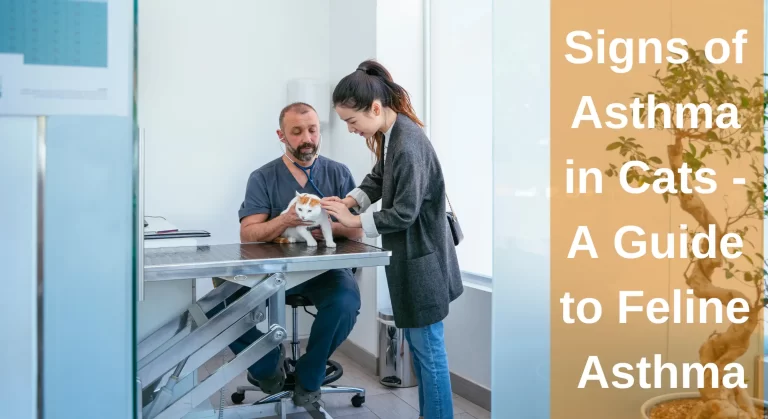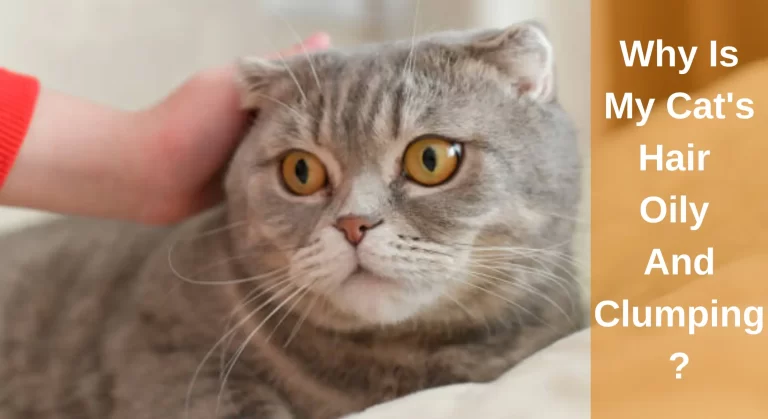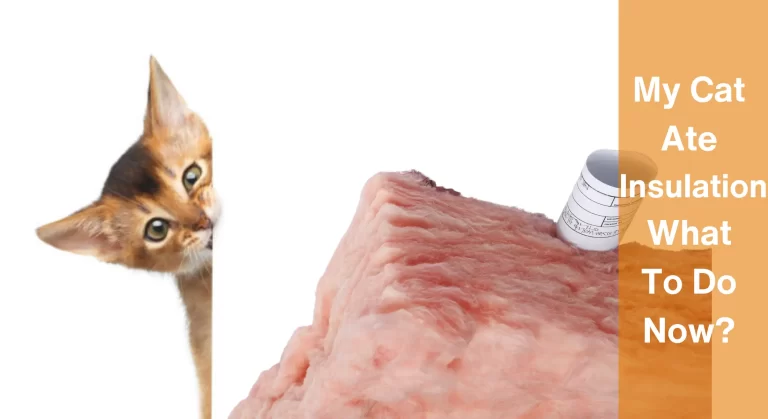Can Cat Urine Cause Headaches? Hazards of Ammonia from Dirty Litter Boxes
We find cats to be intriguing, delightful creatures. Cat owners can all agree, however, that maintaining litter boxes is one of the most difficult duties associated with cat ownership. Beyond the inconvenience and cleaning, handling your cat’s poop and waste on a daily basis is unhealthy.
Can cat urine cause headaches? Yes, to respond quickly. This is not to say that everyone will get headaches from cat pee, and you might or might not become sick from your cat’s feces.
A filthy litter box is not only repulsive, but it also endangers your well-being. Even though emptying the litter box is a horrible chore, neglecting it might make life substantially worse.
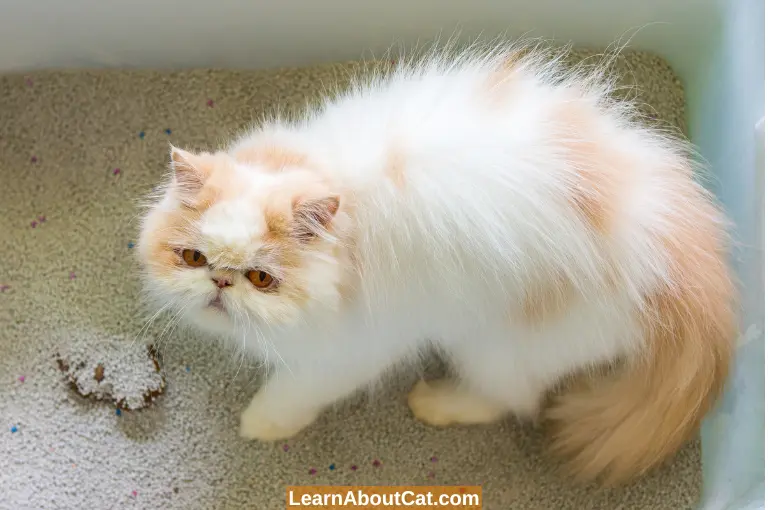
Can a Dirty Cat Litter Box Make Your Cat Ill
Yes, dwelling next to a dirty litter box may cause a number of unpleasant ailments, such as:
1. Salmonellosis
Salmonellosis spreads from the cat to the person through the cleaning of the litter box after the cat, which may or may not show symptoms, becomes infected. Vomiting, diarrhea, fever, and cramping in the abdomen may occur in this disease.
2. Cat Scratching Fever
Cat scratch fever is only one of the bacterial infections that people can get by consuming tainted cat litter, according to the Centres for Disease Control (CDC). Each year, it affects 10,000 people, 500 of whom require hospitalization. Humans are unable to contract cat scratch fever; only cats can.
3. Roundworms
Parasites may live and grow in cat feces. For instance, roundworms may go from cat feces to people, where they can then cause their new host to experience symptoms such as diarrhea, coughing, weight loss, nausea, and other unpleasant things. If you suspect your cat has roundworms, schedule an immediate appointment with a veterinarian and use extra caution when cleaning the litter box. excessive exposure to ammonia.
Check Out: Can Cats Find Their Litter Box If You Move It?
Dangers of Dirty Litter Boxes

1. Inhaling Cat Poop May Make You Sick
Cat feces contain the toxin ammonia, which may cause headaches, asthma attacks, and even potentially fatal respiratory illnesses like pneumonia. The risk of sickness from excessive ammonia exposure is higher in children, the elderly, and those with weakened immune systems.
2. Unpleasant Smell in the House
The entire house will smell foul from cat feces that have mold on them. Despite how useful a covered box is, daily scooping and cleaning are still required. You may stop smelling it after a time, but your guests, neighbors, or landlord almost definitely will.
Be cautious and keep your cat’s litter box neat as a result. Consider using vinegar and water for a more eco-friendly method of cleaning the litter box in place of soap. Consider utilizing a Modkat Odour Filter Kit to minimize unwanted odors.
3. A Dirty Litter box Might also make Your Cats Sick
Given that your cat routinely uses the litter box for long enough to relieve herself, it makes it natural that she would be the first to get sick. Cats with filthy litter boxes are more prone to experience problems with the kidneys, bladder, and urine system. When a cat squats over a pile of waste, bacteria might travel up the urethra and cause trouble along the way. Additionally, because UTIs in cats are commonly asymptomatic, your cat may be sick for a long period before you realize she requires medical treatment.
4. Toxoplasmosis Poses a Very Serious Risk to Expectant Mothers
One of the biggest dangers that cat litter exposes people to is toxoplasmosis. Cats can transmit the parasite Toxoplasma gondii through their feces. If you come into touch with that excrement, which is likely to occur if the litter box is full, you run the danger of catching an illness. Few people will experience flu-like symptoms, but most people won’t. Additionally, toxoplasmosis in pregnant women might result in miscarriage or stillbirth.
Why Does Cat Pee Have a Terrible Smell?

- Cat feces from healthy and ordinary cats include various substances. Water makes up the majority of the liquid and is neither harmful nor repulsive to people, as is common knowledge. Other elements in urine include bacteria, salt, pheromones, urobilin, uric acid, and urea.
- Cat pee smells bad because of a urea-containing component of urine. Despite the fact that urea is an odorless chemical by itself, bacteria in the urine allow it to degrade and produce ammonia, which gives cat pee its very disagreeable smell. As the urea continues to break down, mercaptans are also released. the exact same component that gives skunk sprays its unpleasant smell!
- Because more of the urea is converted into these unpleasant chemicals over time, the longer the urine is left, the worse it smells. The stronger the concentration, the harsher the scent of cat urine will be. This is due to the fact that germs and decaying urea will be present in higher concentrations in your cat’s urine.
Also Read: Why Does My Cat’s Poop Smell So Bad?
Is it Possible for Cat Urine to Cause Headaches?
We may start to understand the reasons why cat urine may occasionally cause headaches as well as the precise molecules to blame now that we are aware of the components of pee.
- The ammonia produced as a result of urea breakdown endangers human health. Cleaning up after our cats may give me and many other cat owners headaches because in extreme cases, breathing can trigger migraines.
- The probability that you could develop a headache from your cat’s urine depends on a number of factors, including how many cats you have, where they pee, and how well-ventilated your home is. The concentration of ammonia in the air and the intensity of its effects will vary depending on each of these variables.
- For example, those who don’t drink a lot of water and live in a home with a lot of cats are more prone to get headaches. If they have a cat who sprays or has accidents in the house that can go unreported and aren’t cleaned up right away, the probability is noticeably raised.
- Contrarily, a person who has a single cat, ensures that it uses the litter box, and lives in a house with good ventilation will be less prone to headaches.
- Additionally, you could find that the soreness was first brought on by your cleaning materials! That’s right, the cleaning products we use to get rid of cat feces may really be making our headaches worse or perhaps giving us new ones. Strong odors from cleaning materials might cause headaches in those with sensitive noses. It’s conceivable that artificial fragrances turn your cat off.
What Further Dangers Might Cat Urine Cause?
If you get a strong headache like a migraine, it can be agonizing and frustrating. However, cat urine also poses a variety of other risks and harms your health.
- First, ammonia may cause respiratory difficulties. Therefore, anyone who already has a respiratory condition like bronchitis or asthma should handle cat urine with extra caution. It may also result in someone developing asthma if they haven’t already, in addition to making their disease worse.
- Again, the risk that you may get respiratory problems increases as the amount of ammonia in the air increases. It appears that only really strong instances might impair your respiratory system, similar to how headaches do.
- Because of this, allergies are a more serious and pervasive issue. Despite the fact that most people primarily associate cat allergies with sensitivity to cat hair and dander, cat urine includes allergens. Some people will be more sensitive than others, while some people won’t feel anything at all. This is caused by the specific immunological response we have.
- Cat excrement may cause some individuals to experience normal allergy symptoms, such as asthma, coughing, a runny nose, and itchy or watery eyes.
Hazards Associated With Cat Faeces and Urine
- There is no doubt that cat poop and waste pose a health danger. Cat feces can cause toxoplasmosis, a dangerous disease that affects humans. In the first several weeks after exposure, flu-like symptoms might result from Toxoplasma Gondii exposure. As the parasite multiplies, a variety of other neurological disorders and adverse effects include inflammation of the brain, and effects on the heart, liver, eyes, and ears might also manifest.
- Another illness that might attack you after coming into touch with cat feces or urine is cryptosporidiosis. Like toxoplasmosis, cryptosporidiosis may afflict both cats and people. Cryptosporidiosis primarily affects those with weakened immune systems, like other zoonotic illnesses.
- All species’ urine has dangerously high ammonia levels. Despite the fact that ammonia has been discovered in many industrial and cleaning products, the emission is usually of a regulated kind. Open litter boxes that have been exposed to cat poop for a number of days might provide a modest health risk.
- High levels of ammonia in urine, especially cat urine, can lead to respiratory issues as well as skin and eye issues. The process of gaseous urine evaporation results in the release of water. As a result, air pollution from dangerous gases may occur, which may cause a number of problems for a person’s airways.
- You are more likely to have health problems brought on by cat feces and urine if you already have respiratory conditions or a compromised immune system.
Interesting Reading: How to Get Cat Pee Out of a Couch?
Here are Some Tips on How to Reduce the Dangers Associated with Cat Urine
The hazards that cat urine brings to your health may, fortunately, be minimized with a few simple methods! So, try using these methods and see if it helps if you frequently get headaches when cleaning your cat’s litter box or have allergies to cat excrement.
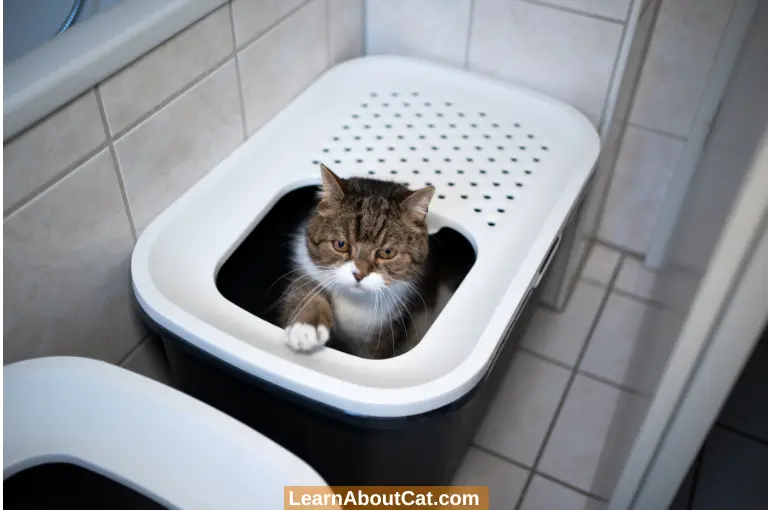
1. Change Your Cleaning Procedure
You can change how you get rid of cat poop. Wear safety equipment, to begin with! Use an ammonia-inhibiting respirator if you are aware that you are prone to headaches and allergies. Always use gloves while handling objects covered with excrement to avoid any incident.
Second, confirm that you’re using the right cleaning materials. To get rid of the ammonia smell efficiently, you must use an enzymatic cleanser. This promotes urine decomposition, keeping it from remaining on surfaces for a long time and simplifying cleanup.
2. Provide Adequate Ventilation to the Area
With an increase in ammonia levels in the air, cat urine dangers rise. Making sure the space is well-aired is the simplest method to avoid headaches or other health problems.
Throw the object coated in cat pee into the garden right away if your cat has an accident outside of the litter box. To let in some fresh air, open every window and door in the area.
This will help lower the ammonia level in the air.
3. Maintain Regular Litter box Cleaning
Your cat’s litter box will produce less ammonia in the air if you clean it frequently. By cleaning the litter box every day, you can stop the bacteria from completely turning the urea in your cat’s urine into ammonia. Even though you may be cleaning more, the adverse effects on your brain and general health will be fewer.
You should always empty, clean, and replace the litter pan even if you scoop it once a week. Ammonia odors may be absorbed by plastic, which over time can accumulate and cause headaches. Stainless steel litter boxes are a terrific option for anyone who suffers from headaches since they don’t retain unpleasant odors!
The Bottom Line on Can Cat Urine Cause Headaches
In conclusion, cat pee can cause headaches. Although there is relatively little risk, the air frequently needs to be highly ammonia-rich. By using cleaning methods that lessen urine odors, maintaining a clean litter box, and proper ventilation of the area, headaches can be significantly minimized. Additionally, be on the lookout for any cleaning products with strong scents as they can be making your headache worse.
Who is Isabella?
My name is Isabella, and I am a dedicated and knowledgeable cat enthusiast. With years of experience caring for cats and a deep love for felines, I made a mission to help other cat lovers navigate the challenges of cat ownership.

